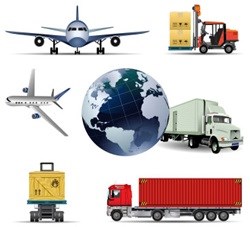






The African CEP growth storyline has been enabled by globalisation, the digital revolution and explosive consumption growth that has been led by a burgeoning middle class. It seems that Africa's vast mineral store is beginning to benefit the broad structure of its society at last.
This broad based consumption growth has attracted the attention of African and multinational companies vying for market leadership in a fast growing continent. Indeed Africa's socioeconomic position is being likened to an India of 20-30 years ago.
The result has been the creation of new 'silk roads' that stretch from a score of strategic sub-Saharan African ports - to the developed markets of the West and to Asia. These roads are enabled by an increasingly sophisticated intra-African logistics network that have stimulated trade just as the great railroads of Europe and the USA did during their early years.
Inevitably, because of its timing, Africa's logistics 'gold rush' has given rise to the logistics giants redefining the "road" concept. For the first time the establishment of silk roads are enabled by vast fleets of air and seaborne carriers in addition to road transport, and of course digital information flow.
This silk road happens at a time where speed is of the essence, and lead times need to be short. Reactivity is the watchword as the internet and innovation level the competitive playing field. Logistics is once again the surest path to competitive advantage just as it was so long ago.
Despite slow growth globally since 2008, CEP companies in particular have thrived - bent on conquering emerging economies and in particular Africa's emerging 'silk trade routes': from DHL Express et al - global players who are determined to continue their domination of the international CEP space, and who are acquiring local footprint through acquisition (Aramex - Berco and others) or through alliance with local CEP players to augment local delivery, to local giants - like SkyNet and Ram who have the advantage of strong footprints in "local" countries.
However, there seems to be differing strategies. Ram has forged international alliances to cope with the global demands of local customers: SkyNet has created a global SkyNet branded family of strong local players into an international network that rivals the global players, but which mostly dominate in their local countries.
The uniqueness of their network is the combination of global and local strength. In fact many of the multi-national clients in African Countries demand that CEP players provide both a local and international solution making a solid local footprint a real competitive advantage. It seems there are many roads that lead to Rome in this African CEP revolution.
Of course Africa's performance over the last decade, and in particular its ability to grow despite difficult times in the West, has led to multinationals - seeking growth - to focus on the continent like never before. The Intra Africa trade is of particular interest with South Africa being well positioned to benefit from this.
The bulk of the region's trade is with Europe and America: only 12% is with other African countries, according to research by Ecobank, a Togo-based bank. By comparison 60% of Europe's trade is with its own continent. The same is true in Asia. In North America the figure is 40%. (as published by the Economist).
African multinationals, freed from their shackles, have not bowed down and have entered the fray. They have the advantage of local knowledge in a sometimes difficult to understand continent. Retailers, from banking to FMCG are swarming all over Africa. They are matched in their vigour by mining houses, and the service companies from IT, to accounting to legal. In this modern scramble for Africa the colonial governments are replaced by the multinational, but in this case the "locals" are putting up quite a fight.
Capital it seems follows the winners. Locally based African "multinationals", no longer at the mercy of global predators, have the massive advantage of both local knowledge and support.
Research shows that they understand developing country conditions better than their Western counterparts and can therefore act faster and mitigate risks that others simply can't - or won't. Of course the global players have the advantage of their networks and their massive capital base.
For local consumers of the products and services, the questions are not so much of loyalty, but rather who gets the job done best, and at the lowest price. And it is likely that clients and consumers will not give their custom away lightly.
The options for investors and customers alike are greater than in the original times of the silk road. African countries are beginning to vie between themselves for business. They are keen to support local businesses, and will buy locally if they can, but are keenly aware that they need to attract foreign investment and skills, and that they need value and efficiency.
DHL is the dominant global player. It has offices in all African countries, and concentrates on moving parcels between countries. Local deliveries in big cities are often delivered by their yellow trucks. They rely on strong local players in most markets for more difficult deliveries. They are owned by a listed German business, have a big balance sheet, and are formidable African players.
SkyNet is probably their most credible African opposition. SkyNet is also in the vast majority of African countries with partnerships giving them reach to those countries where they do not have direct representation. Their local branch networks are often more extensive than DHL's, because they are an integrated alliance of the most powerful "local" players.
In South Africa for instance it has 34 branches, and delivers to 450 towns daily. It is owned locally. They have effectively forged a best of country set of alliances across the continent and the world and compete with the likes of DHL. They can do this only because the digital world allows their integration. They also have the advantage of very strong local clients who are themselves spreading their wings into Africa. At the time of the building of the original silk roads they would have been rendered local only.
The African CEP market is also being fuelled by the boom in the online B2C industry. Some estimates already put B2C deliveries at 1 in every 4 of all packages delivered by CEP businesses in the West.
The pace of online retail growth in Africa will depend on the rapid uptake of digital connectivity, the high rate of consumptive growth rates of the growing middle class, and the availability of rapid delivery systems. South African B2C growth rates are indicative of the existence all of these preconditions. eMarketer reports a growth of South African online retailing from R3,3m in 2012 to a projected R4,4m in 2013 - a growth of 33%. South Africa has 3,3% of the global online marketplace.
This far outpaces its share of global GDP at 0.6%. Although reliable and up to date figures on continental performance are hard to find, it is likely that Africa is one of the unlikely leaders in online retail use.
As stated this growth is enabled by efficient, reliable, swift and cost effective delivery systems. The current African CEP giants have already provided this, and will themselves be strengthened as the forecast of the doubling of smartphone use on the continent next year becomes a reality.